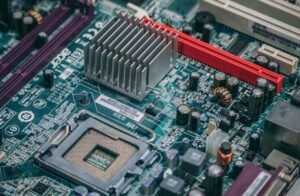AI Examples in Real Life
Artificial Intelligence (AI) is revolutionizing various industries and transforming the way we live and work. From virtual assistants to self-driving cars, AI is becoming increasingly prevalent in our daily lives. In this article, we will explore some real-life examples of AI applications and their impact on society.
Key Takeaways:
- AI is being used in various industries to solve complex problems.
- Real-life AI examples include virtual assistants, autonomous vehicles, and medical diagnostics.
- AI has the potential to enhance productivity, improve efficiency, and drive innovation.
One of the most well-known and widely used AI applications is virtual assistants such as Siri, Alexa, and Google Assistant. These voice-activated assistants use natural language processing and machine learning algorithms to understand and respond to user queries. *Virtual assistants have become integral parts of our daily lives, helping us with tasks like setting reminders, playing music, and answering questions.
A growing field in AI is autonomous vehicles, which aim to reshape the transportation industry. These self-driving cars utilize a combination of sensors, cameras, and AI algorithms to navigate roads and make decisions. *Autonomous vehicles have the potential to reduce accidents, increase mobility, and revolutionize the way we commute.
In the healthcare industry, AI is being used for medical diagnostics. Machine learning algorithms can analyze vast amounts of medical data, assisting doctors in diagnosing diseases such as cancer and diabetes more accurately. *With AI-powered diagnostics, early detection and personalized treatment plans can be developed, potentially saving lives.
AI Applications in Various Industries
AI has transformative applications across diverse sectors. Let’s explore some industry-specific examples:
Table 1: AI Applications in Various Industries
| Industry | AI Applications |
|---|---|
| Finance | Automated trading algorithms |
| Retail | Product recommendation systems |
| Manufacturing | Quality control and predictive maintenance |
AI also has a significant impact on customer service. Chatbots, powered by AI, can provide instant and personalized responses to customer inquiries, improving customer satisfaction and reducing response times. *By utilizing AI in customer service, businesses can enhance their overall customer experience.
Another AI application is in cybersecurity. AI algorithms can analyze large volumes of data to detect patterns and anomalies, helping to identify and combat potential cyber threats. *With AI-powered cybersecurity systems, organizations can stay one step ahead of cybercriminals.
Let’s now explore some impressive statistics and data related to the impact of AI:
Table 2: Impact of AI
| Data Point | Information |
|---|---|
| Percentage of businesses currently using AI | 37% |
| Projected annual economic growth due to AI technologies by 2030 | 14.5% |
| Estimated cost savings from business AI implementations by 2025 | $8 trillion |
Moreover, AI-powered translation tools have significantly improved over the years. These tools utilize machine learning to translate text accurately across different languages, breaking down language barriers and facilitating communication. *The advancements in AI translation technology have made it easier for people to connect and collaborate globally.
Challenges and Future Implications
While AI brings tremendous opportunities, it also presents challenges and ethical considerations. One such concern is the potential impact on job displacement, as AI automation may replace certain job roles. However, AI also creates new job opportunities in developing and managing AI systems. *Striking a balance between job displacement and creation is essential for a smooth transition into an AI-enabled future.
Nonetheless, the future implications of AI are promising. As AI continues to advance, we can expect greater integration of AI technologies in our daily lives and across industries. *The power of AI lies in its ability to learn and adapt, which opens up endless possibilities for innovation and problem-solving.
AI Examples: Transforming the Way We Live
From personal virtual assistants to self-driving cars and medical diagnostics, AI examples permeate various aspects of our society. The applications of AI extend beyond those mentioned in this article and continue to expand as technology progresses. *As AI becomes more prevalent, it will undoubtedly shape the future and redefine industry standards.

Common Misconceptions
Misconception 1: AI will replace humans in the workforce
One common misconception about AI is that it will completely replace humans in the workforce. While AI technologies have the potential to automate certain tasks and job roles, they are designed to enhance human capabilities rather than replace them.
- AI complements human skills, increasing efficiency and productivity in various industries.
- Humans are still essential for decision-making, creativity, and complex problem-solving, which AI struggles to replicate.
- The integration of AI often leads to the creation of new job opportunities in AI-related fields.
Misconception 2: AI is infallible and error-free
Another misconception is that AI is infallible and error-free. AI systems are not flawless and can exhibit biases or make mistakes based on their training data and algorithms.
- AI models can absorb biases present in the datasets used for training, leading to biased outputs and decisions.
- Technical issues, such as incorrect data inputs or faulty algorithms, can also result in errors in AI systems.
- Regular monitoring and testing are crucial to identify and address potential errors in AI systems.
Misconception 3: AI is only accessible to large corporations
Many people believe that AI is only accessible to large corporations with extensive resources and budgets. However, AI technologies have become more accessible and affordable in recent years, empowering smaller businesses and entrepreneurs as well.
- Cloud-based AI platforms and services allow businesses of all sizes to implement AI solutions without large upfront investments.
- Open-source AI libraries and frameworks provide opportunities for individuals and smaller organizations to develop AI applications.
- AI-as-a-Service models enable companies to leverage AI capabilities without the need for extensive in-house AI expertise.
Misconception 4: AI is only about robots and automation
AI is often mistakenly associated exclusively with robots and automation. While AI plays a significant role in robotic systems, it encompasses a broader range of applications beyond physical automation.
- Natural Language Processing (NLP) allows AI to understand and analyze human language, facilitating chatbots, language translation, and voice assistants.
- AI is utilized in computer vision applications, enabling facial recognition, object detection, and self-driving cars.
- AI powers recommendation systems, personalized advertising, fraud detection, and other data-driven decision-making processes.
Misconception 5: AI will lead to a dystopian future
There is a common fear that AI will lead to a dystopian future where machines dominate and endanger humanity. While AI does present ethical and societal challenges, it is important to separate fact from fiction.
- Implementing ethical AI guidelines and regulations help mitigate the risks associated with AI deployments.
- AI development and decision-making processes involve human oversight and accountability.
- AI technologies have the potential to solve complex societal problems, improve healthcare, and enhance our daily lives when used responsibly.

AI Examples in Real Life
Artificial Intelligence (AI) has become an integral part of our daily lives, transforming various industries and revolutionizing the way we interact with technology. This article explores ten captivating examples of AI applications across different sectors, showcasing the remarkable capabilities of this advanced technology.
1. Medical Diagnosis Assistance
AI-powered systems provide support to healthcare professionals in diagnosing diseases by analyzing medical images and patient data, reducing diagnostic errors and improving overall accuracy.
| AI Software | Accuracy | Developer |
|---|---|---|
| Watson for Oncology | 96% | IBM |
| DeepMind Health | 94% | DeepMind (Google) |
2. Autonomous Vehicles
AI is driving the advancement of autonomous vehicles, making roads safer and enabling efficient transportation systems while reducing human error.
| Company | Total Distance Driven | Accidents |
|---|---|---|
| Tesla | 2 billion miles | 1 accident per 4.53 million miles |
| Waymo (Google) | 20 million miles | 1 accident per 11 million miles |
3. Virtual Assistants
AI-powered virtual assistants have become our reliable companions, helping us with daily tasks, organizing schedules, and answering our queries promptly.
| Virtual Assistant | Users | Market Share |
|---|---|---|
| Alexa (Amazon) | 200 million+ | 32.3% |
| Google Assistant | 100 million+ | 29.9% |
4. Fraud Detection
AI algorithms can analyze vast amounts of data in real-time, enabling rapid detection and prevention of fraudulent activities across various industries.
| Industry | Reduction in Fraudulent Claims | AI Solution |
|---|---|---|
| Insurance | 40-60% | AI Fraud Detection Systems |
| Finance | 75-90% | AI-Driven Fraud Analytics |
5. Natural Language Processing
AI-driven natural language processing allows machines to comprehend human language, improving translation accuracy and facilitating communication.
| Translation Service | Accuracy | Languages Supported |
|---|---|---|
| Google Translate | 80-90% | 100+ |
| Microsoft Translator | 90% | 60+ |
6. Recommender Systems
AI-powered recommender systems analyze user preferences and behavior to personalize recommendations, enhancing user experience across e-commerce and entertainment platforms.
| Platform | Increased Sales | AI Recommender System |
|---|---|---|
| Amazon | 29% | Amazon’s Recommendation Engine |
| Netflix | 80% | Netflix’s Algorithm |
7. Cybersecurity
AI algorithms bolster cybersecurity measures by rapidly identifying potential threats, protecting confidential data, and preventing unauthorized access.
| Company | Cyber Threats Detected | AI Security Solution |
|---|---|---|
| Darktrace | 120,000+ | Enterprise Immune System |
| Cylance | 99.1% malware detection rate | CylancePROTECT |
8. Personalized Medicine
AI enables personalized treatment plans by analyzing patient data, medical records, and genetic information, revolutionizing healthcare and improving patient outcomes.
| Application | Improvement in Treatment Success Rate | AI-Powered Platform |
|---|---|---|
| Cancer Treatment | 30-40% | IBM Watson Genomics |
| Drug Development | 50% faster | Atomwise’s AI Platform |
9. Agricultural Optimization
AI helps optimize agricultural practices by monitoring crop health, predicting weather conditions, and enhancing overall crop yield.
| Solution | Yield Increase | Developing Company |
|---|---|---|
| Agrosmart | 20-30% | Agrosmart Inc. |
| Climate Corporation | 5-10% | Climate Corporation (Bayer CropScience) |
10. Robotics
AI-driven robotics automate tasks, improve efficiency, and enhance productivity in various industrial and domestic settings.
| Company | Robots Deployed | Applications |
|---|---|---|
| RobotWise | 100,000+ | Warehouse Automation |
| Aeolus Robotics | 10,000+ | Domestic Assistance |
In conclusion, AI is spearheading transformative changes in various domains, offering immense potential for innovation, efficiency, and improved quality of life. The examples highlighted in this article provide just a glimpse into the wide-ranging applications of AI in real-life scenarios. As the technology continues to evolve, we can expect even more awe-inspiring advancements that will shape the future of industries and society as a whole.
Frequently Asked Questions
What are some real-life examples of AI?
Some real-life examples of AI include virtual assistants like Siri and Alexa, self-driving cars, recommendation systems used by streaming platforms, fraud detection systems in banking, facial recognition on social media platforms, and predictive algorithms used in weather forecasting.
How does AI impact healthcare?
AI is revolutionizing healthcare by assisting in diagnosing diseases, identifying treatment plans, and streamlining administrative tasks. It enables early disease detection, personalized medicine, and automation of repetitive tasks, resulting in improved patient outcomes and reduced costs.
What industries benefit from AI?
Multiple industries benefit from AI, including healthcare, finance, retail, transportation, manufacturing, and education. AI technologies improve efficiency, optimize processes, and enhance decision-making capabilities across various sectors.
What are the limitations of AI?
AI has certain limitations, such as the inability to understand context and emotions accurately, lack of common sense reasoning, susceptibility to bias in data, and potential job displacement. Additionally, AI systems require large amounts of data and computing power, making their development and deployment costly.
How is AI used in customer service?
AI is used in customer service to provide chatbots and virtual assistants that can assist customers with inquiries, offer personalized recommendations, and even process transactions. Intelligent systems can handle a high volume of customer interactions, resulting in improved efficiency and customer satisfaction.
What ethical considerations are associated with AI?
Ethical considerations related to AI include privacy concerns, potential biases embedded in algorithms, impact on employment and income inequality, accountability for AI decisions, and ensuring transparency in AI systems. It is essential to develop and use AI technologies in a way that benefits society while mitigating potential risks.
What are the challenges in developing AI applications?
Developing AI applications comes with challenges such as acquiring and managing large datasets, ensuring data privacy and security, selecting appropriate AI algorithms, addressing algorithm bias, and maintaining AI systems’ reliability. Additionally, ethical considerations and regulatory compliance are crucial aspects to consider during development.
How does AI contribute to environmental sustainability?
AI enables environmental sustainability through various applications such as optimizing energy consumption, predicting and mitigating climate change impacts, enhancing waste management, improving resource allocation, and advancing renewable energy technologies. It helps in creating a more sustainable and greener future.
What role does AI play in autonomous vehicles?
AI plays a significant role in autonomous vehicles by enabling them to perceive the surrounding environment, make real-time decisions, and navigate safely. It involves technologies like computer vision, sensor fusion, machine learning, and path planning algorithms, contributing to the development of self-driving cars.
How is AI transforming the financial industry?
AI is transforming the financial industry by automating routine tasks, improving fraud detection, enhancing risk assessment, developing personalized financial recommendations, and enabling more efficient trading strategies. AI algorithms analyze vast amounts of financial data to support decision-making processes and improve overall industry performance.




